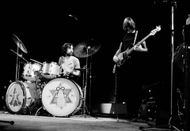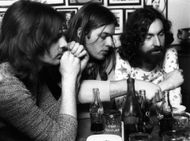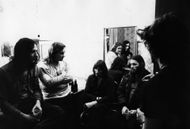Emerging from the cultural revolution of the 1960s, Pink Floyd fashioned a sound world of their own, a world that broke the rules and rewrote the book on rock music. Rather than just playing songs, they constructed rich sound worlds, interweaving mystical instrumentals with introspective personal statements and concept-driven narrative.
Their music, rich in atmosphere and multiple meanings, opened up new avenues for the genre, solidifying their position as musicians and as visionaries of emotion and imagination. Spanning generations, their music not only survived but flourished, testing listeners with its emotional depth, stinging social commentary, and philosophical subtlety.
Not mere assemblages of songs, albums such as The Dark Side of the Moon and The Wall are sophisticated narratives, each song adding to a larger inquiry into the human condition. Not merely classics, but lasting benchmarks in music history that continue to resonate with old and new listeners in unadulterated power.

Singles like Comfortably Numb, Wish You Were Here, Time, and Shine On You Crazy Diamond are milestones in their catalog. Each of them is instantly familiar, ceaselessly referenced, and permanently inscribed into the history of rock. Each of these songs, with its one-of-a-kind tone and poetical heft, doesn't just take up space on a record; it lingers, far beyond the moment when the last note fades.
It is this ability to pen songs which are personal and monumental at the same time that cements their place not only as artists, but as master architects of feelings. Even as music taste changes and technology reshapes how we hear, their music remains ageless, streamed by generations, analyzed in dorm rooms, and played on vinyl as a sacrament.
There's weight to their music, a draw that's more than nostalgia and approaches reverence. It's not what they did, but how you felt when they did it, lost, discovered, provoked, and reassured all at the same time.
Disclaimer: This article contains the writer's opinion. The reader's discretion is advised!
Here are the 10 greatest Pink Floyd songs of all time
These are the top 10 greatest Pink Floyd songs of all time, a group that reflects the stunning emotional breadth, sonic adventurousness, and literary sensibility of the collective. These are not a die-hard fan's wildest delusion list; these are the condensed power of Pink Floyd's decade-long grip on the world of music.
From grand to hushed reflection, every track here below captures the band's unique mix of ambiance, class, and well-won feeling. Whether you're revisiting these classics or discovering them for the first time, they stand as proof of the band’s unmatched ability to turn sound into experience.
1) Comfortably Numb
Comfortably Numb ranks among Pink Floyd's best moments of terror, a slithering embrace of affective numbness wrapped around one of the greatest guitar solos in rock music. On The Wall (1979), the song is not merely narrating a tale but evokes the feeling of vanishing out of one's self.
Roger Waters' lyrics sound abstracted, as if they are being sung over a haze, but David Gilmour's guitar solos and chorus vocals break through as if explosions of pent-up emotion trying to burst onto the outside.
That conflict in vocals, aloof and agonized, grabs hold of a primal struggle in the song: the conflict within and against oneself to shut up and but feel something, anything. Instead of providing an answer, Comfortably Numb gets trapped in the indeterminacy of disconnection when Gilmour's final solo bleeds unsolved emotion into it. It's not music, it's accounting.
2) Wish You Were Here
Few of Pink Floyd's tracks cut so deeply as Wish You Were Here. Released in 1975 as the centerpiece of the album with the same name, it finds a muted hurt, one that isn't necessarily about personal loss but rather a broader feeling of emotional displacement. Rather than constructing an overt tribute, the band lets the power of what isn't said have its impact.

The lo-fi opening to the song, as if over radio static from a distant station, transitions seamlessly to Gilmour's acoustic work with an ethereal delicacy. His voice, melding with Waters' snarling words, mourns not just the death of Syd Barrett, but summons the listener up short with the weight of their own alienation.
With no need for grand gesture or overproduction, the song finds its strength in restraint, becoming not just a tribute, but an echo for all who've experienced the hurt of being apart or the blur between being and not being.
Read More: 10 legendary Tupac Shakur songs that made history
3) Shine On You Crazy Diamond
Shine On You Crazy Diamond is not just a record, it's a sonic monument, a glistening, beautiful testament to Syd Barrett that dissolves like memory into the great distance. Released in 1975 as the lead-off track to Wish You Were Here, this nine-section suite never rushes to convey its message; it unfolds at a glacial pace, its background introduction filled with subdued feeling.
David Gilmour's signature four-note motif floats in like a distant echo, at once settling the listener into an irretrievable sense of longing. Rather than merely recounting Barrett's story, Roger Waters weaves threads of admiration, loss, and reflection into lyrics that are simultaneously eulogy and love letter.
The imagery is subtle but stinging, and the lyrics don't just honor what Barrett was, but mourn what he might have been. Musically, the song swells in waves, bluesy guitar solos, ominous synths, and ghostly textures that reflect the beauty and chaos of Barrett's inner world.
But despite all its sorrow, the song is never despairing. There is a quiet awe in each note of it, an aura that Barrett's soul, although fragile, left an indelible mark. Shine On You Crazy Diamond does not cry in the dark, it shines, quietly immortal, testament to genius touched by catastrophe.
4) Money
Money is not only one of Pink Floyd's most popular singles, it's a wittily constructed reflection held against a society that's fallen in love with money. Released in 1973 as part of The Dark Side of the Moon, the song begins with the disquieting sound collage of cash and coin dispensers, instantly announcing its preoccupation with consumerism's grip.
Roger Waters supports the song with a bass line that sways in an uncommon 7/4 rhythm, imbuing the groove with a sly, uneven sense, as if imitating the distortion wealth imposes.

Instead of sermonizing, the lyrics resort to acidic irony to reveal how readily morality curves in the interest of profit. David Gilmour's searing guitar playing and Dick Parry's ferocious sax break add surges of tension and panache, particularly during the fleeting transition into more conventional time that is virtually a release before plunging back into the uneasy beat.
Money is not a song, it's a contemptuous sneer at capitalism, wrapped in rhythm and defiance.
Read More: 10 iconic The Weeknd songs that defined a generation
5) Hey You
Hey You is the most emotionally intense song on The Wall (1979), and it's a desperate cry for human contact in an era of isolation. The song, which is the album finale, is an awareness of tragedy for the subject, his growing isolation from the world that awaits him, and from his own heart. The ballad starts on a soft acoustic guitar strum, which sets the somber atmosphere and welcomes the listeners to be led into the inner conflict of the vocalist.

Roger Waters' eerie vocals set up a situation of desperation and remorse as he pleads passionately to some omnipresent power for clemency. The vocals alternately feature Waters and David Gilmour, the melancholic, weeping melody being brought in by the voice of Gilmour, but the raw voice of Waters in the second half brings desperation and pain.
Throughout the song, the structure is a reflection of the protagonist’s deepening despair. The heartbreaking emotional climax of the song is Gilmour's despairing guitar solo, with passion and despair as the song resolves to an open-ended haunting finish.
Overall, Hey You is a raw presentation of isolation and the vacant yearning for human connection, and therefore an unforgettable and affecting gem on The Wall.
6) Time

Time from The Dark Side of the Moon (1973) is an intense commentary on the transitory nature of life. Starting with clock chimes and alarm bells, it immerses listeners in the idea of time's relentless passage. The lines, especially "And then one day you find, ten years have got behind you," touch on universal regret over lost time.
Gilmour's impassioned vocals and explosive soloing on guitar crank the intensity up in the song, compelling listeners to grab the moment before it is gone.
7) The Great Gig in the Sky
Silently and wordlessly, The Great Gig in the Sky is a reflective examination of life and death, a song that speaks so much more in raw emotional strength. As a song on The Dark Side of the Moon (1973), it's a song that believes in something other than words and in the captivating dialogue between piano and voice to express its deepest thoughts.

The piano accompaniment by Richard Wright provides a tentative backcloth, presaging what is to prove an out-of-this-world experience. Nevertheless, it is Clare Torry's singing that ensures the song lives on. Tentative at first in playing a part, Torry's impromptu singing is an emotional display of desperation, ecstasy, and heavenly freedom, proving that music can survive without words.
While it does brush against death, the song never lingers in despair but instead presents a feeling of calm and freedom. In its wide dynamics and emotional richness, The Great Gig in the Sky is an isolated and unique moment in the history of rock, one that expresses a strong human feeling that words cannot express.
8) Echoes
Echoes begins quietly, not bang but whisper, a solitary, otherworldly note on Richard Wright's organ that gently invites the listener into Pink Floyd's vast, uncharted territory of sound. At over 23 minutes on their 1971 album Meddle, the composition is a respiratory piece that shifts minute by minute, its shape constantly, irretrievably changing as it works its way through filigree harmony, ghostly abstraction, and ecstatic climax.

It's not committed as a straight song, and that's the genius of it, suspends, dips, swells, exactly the feeling of exploration that defined the band's initial '70s work. As David Gilmour's glissando guitar themes break up into Roger Waters' vocal bass, Echoes is an ambient tapestry where sound and silence are equal partners.
Its experimental center, packed with ectoplasmic wails and extraterrestrial textures, redefines what rock music can be, before dissolving into a cathartic finale that is both terrestrial and celestial. More than half a century on, Echoes remains one of Pink Floyd's most ambitious and visionary projects, a journey through space, mind, and sound.
9) Have a Cigar
Have a Cigar, from Wish You Were Here in 1975, features one of Pink Floyd's greatest satirical thrusts, targeted directly at the smooth, mercenary personalities hovering around the band following the enormity of the success of The Dark Side of the Moon. The band instead allowed the message to be conveyed through British folk musician Roy Harper's sneering vocal delivery, whose sarcasm crystallized the cut's satire.

With such lyrics as "By the way, which one's Pink?" the song embodies the mismatch between real talent and money-motivated machinery in the shadows. It's not simply an industry-bashing; it's a moment of cynicism merging with theatrical excellence.
10) Astronomy Domine
Astronomy Domine, the lead track to The Piper at the Gates of Dawn (1967), reduces Syd Barrett's raw, unadulterated fantasy before he fell apart to chaos, steering the band elsewhere. More than just an album track, it's a hallucinatory dispatch from the periphery of the conscious, drinking in astral sound, verbal broadcasts, and psychedelic playing.

It doesn't sit neatly in the psychedelic or progressive rock genres, but instead hangs in mid-air between them, presaging the endless directions Pink Floyd would later explore.
Pink Floyd's songs are not mere music, sensory expeditions that probe the intellect and awaken the heart. With each song, the band etched a special niche where sound was philosophy, emotion was architecture, and silence was as potent as noise.
Their discography is a standing testament to the potency of music to overcome genre, time, and expectation, urging listeners not only to hear but to feel. Decades later, their efforts continue to ring out like a faraway beacon, known, haunting, and boundlessly profound.
Keep reading SoapCentral for more informative content!
Also Read: 8 must-listen Elvis Presley songs of all time
